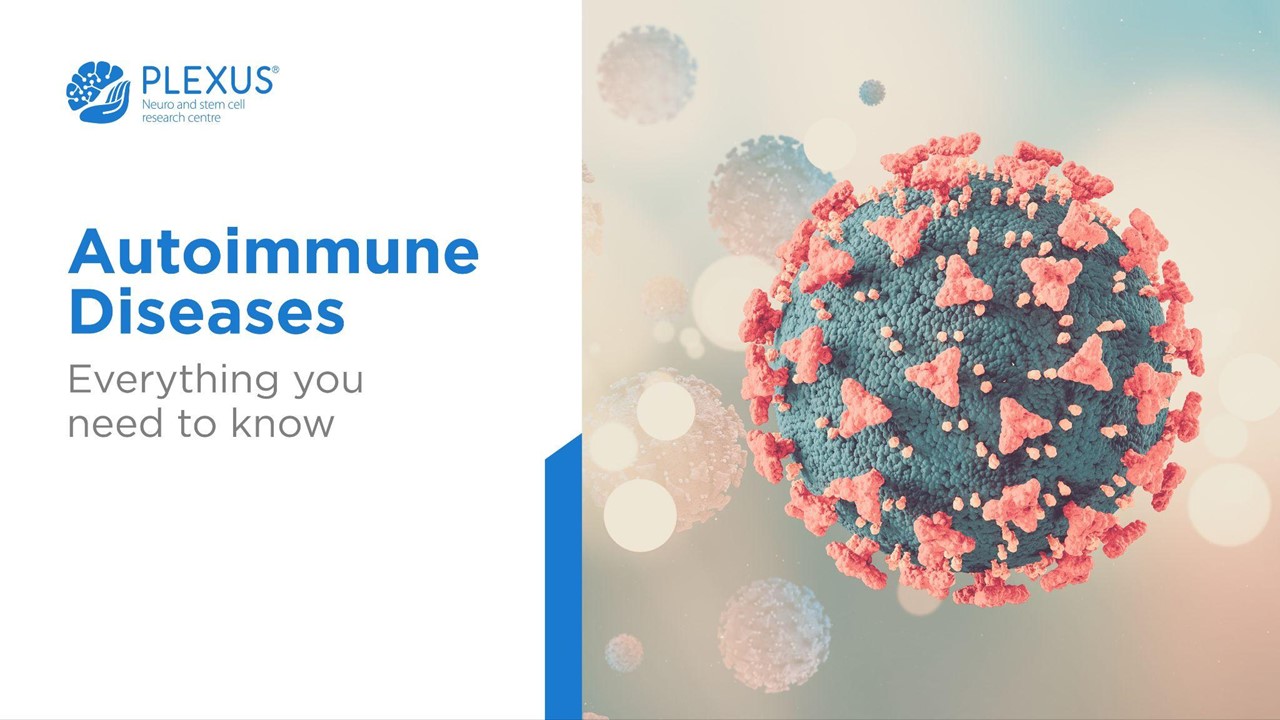Everything you need to Know about Autoimmune Disease | Plexus - PowerPoint PPT Presentation
Title:
Everything you need to Know about Autoimmune Disease | Plexus
Description:
Autoimmune diseases corrupt our healthy immune system and make them attack healthy cells. Most are degenerative and life-threatening. – PowerPoint PPT presentation
Number of Views:0
Title: Everything you need to Know about Autoimmune Disease | Plexus
1
(No Transcript)
2
What are autoimmune diseases?
- Autoimmune diseases corrupt our healthy immune
system and make them attack healthy cells. - Most are degenerative and life-threatening.
3
Types of Autoimmune Diseases
4
Autoimmune diseases of joints and muscles
- Rheumatoid Arthritis
- Immune system attacks the joints
- Symptoms soreness, stiffness, redness, and
warmth in joints - Psoriasis
- Skin cells multiply at a rapid pace leading to
extra build-up - Symptoms inflamed, red/purple patches with
silver white/brown/gray scales all over the body - 30 of psoriasis patients also experience
swelling, stiffness, and pain in their joints.
This condition is called psoriatic arthritis.
5
Autoimmune diseases of joints and muscles
- Systemic Lupus Erythematosus (SLE)
- Affects joints, kidneys, heart, brain, among
other organs - Earliest symptoms Rashes
- Sjörgens Syndrome
- Affects glands that secrete lubrication for the
eyes and mouth - Symptoms Dry mouth, dry eyes, dry skin,
muscle/joint pain, rashes, fatigue, vaginal
dryness
6
Autoimmune diseases of the nervous system
- Systemic Lupus Erythematosus (SLE)
- Disrupts nerve impulses that help the brain to
control muscle and movement - Symptoms Drooping eyelids, speech trouble,
dysphagia, double vision, limb weakness,
inability to hold neck up - Multiple Sclerosis
- Attacks the central nervous system by damaging
the myelin sheath - Symptoms Fatigue, vision problems, numbness,
tingling, muscle weakness, osteoporosis
7
Autoimmune diseases of the skin
- Dermatomyositis
- Affects skin and weakens muscle
- Type of myopathy
- Leads to severe respiratory problems
- Symptoms Dysphagia, reddish purple skin,
shortness of breath, stiffness, weakness,
soreness - Psoriasis (refer to slide 4)
8
Autoimmune diseases of the digestive tract
- Inflammatory Bowel Disease (IBD)
- Inflammation along the lining the intestinal wall
- Symptoms Diarrhoea, rectal bleeding, fever,
weight loss, anaemia, abdominal pain,
malnutrition and delayed growth (in children) - Crohns disease - inflammation along any part of
the GI tract (from mouth to anus) - Ulcerative colitis - inflammation along the
lining of the large intestine and rectum - Celiac Disease
- Attacks small intestine
- Triggered by gluten
- Symptoms Diarrhoea/ constipation, recurrent
stomach ache, cramping, bloating, anaemia,
fatigue, nausea, vomiting, folic acid deficiency
9
Autoimmune diseases of the endocrine system
- Graves Disease
- Attacks the thyroid gland
- Results in hyperthyroidism
- Symptoms Mood swings, fatigue, irregular
heartbeat, weight loss, profuse sweating,
frequent bowel movements - Hashimotos Thyroiditis
- Slows down the secretion of thyroid hormone
- Leads to hypothyroidism
- Symptoms Mild weight gain, constipation, dry
skin, lethargy, joint stiffness, muscle pain,
bradycardia
10
Autoimmune diseases of the endocrine system
- Addisons Disease
- Attacks the adrenaline glands
- Disrupts production of cortisol, aldosterone, and
androgen hormones - Symptoms Lethargy, muscle weakness,
irritability, unintentional weight loss, salt
cravings, increased thirst - Other autoimmune diseases
- Type 1 Diabetes
- Autoimmune Vasculitis Caused by inflammation
that narrows veins and arteries - Pernicious Anaemia Disturbs stomachs lining,
leads to vitamin B12 deficiency
11
Risk factors of autoimmune diseases
- Family history
- Smoking
- Exposure to toxins
- Obesity
- Side effects of certain medications
- Being female - nearly 78 of autoimmune disease
patients are women - Already having one type of autoimmune disease
12
Diagnosing autoimmune diseases
- Based on your symptoms, age, and medical history,
the following tests may be advised by your
neurologist - Antinuclear Antibody Test (ANA)
- Erythrocyte Sedimentation Rate (ESR)
- Complete Blood Count (CBC)
13
Stem cell therapy for autoimmune diseases
- Mesenchymal stem cells (MSCs) immunomodulatory,
tissue-protective and repair-promoting properties
have helped improve the quality of life of
patients with autoimmune conditions, manage their
symptoms, and also regulate the immune system. - Plexus uses either autologous mesenchymal cells
or cord cells depending upon the patient's
condition. - To know more, reach out to us today.
- WhatsApp 91 89048 42087
- Call 91 78159 64668 (Hyderabad) 91 82299
99888 (Bangalore)
Be the first to comment on this presentation.































